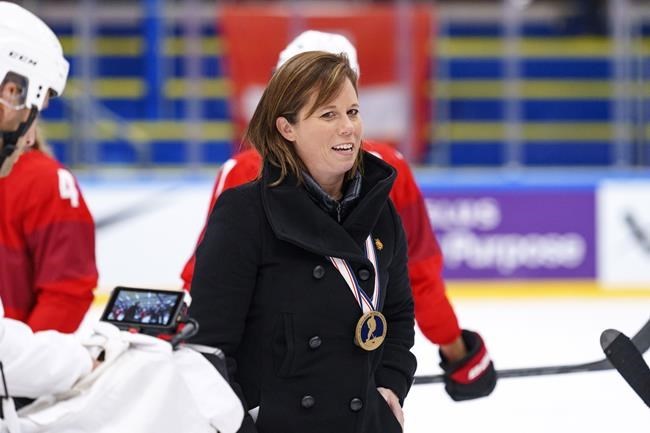Professional Women's Hockey League general manager Gina Kingsbury and coach Carla MacLeod, who both have deep roots in international hockey, say the new league can close gaps between countries on the world stage.
A long-standing criticism of international women's hockey is its predictability. Canada and the United States have met in every world and Olympic final with the exception of the 2019 world championship and 2006 Olympic Games.
The world order behind the North Americans shuffles periodically, but the same two countries battling for gold isn't seen as a marketing boon for the game.
The 13 players drafted into the PWHL on Monday from seven European countries will be difference-makers on their national teams and raise the playing level of those countries, say Toronto GM Kingsbury and Ottawa coach MacLeod.
"I think it's going to play a massive role," Kingsbury told The Canadian Press. "When you look at the history on the men's side, I think the game grew globally once a lot of Europeans came over to play in the NHL. I think it's going to be the same in our game."
Teammates on Canada's victorious Olympic teams of 2006 and 2010, Kingsbury and MacLeod have travelled a women's hockey arc from their days of dreaming of a viable women's pro league to working in one.
The PWHL hired Kingsbury away from Hockey Canada after her five years running the Canadian women's team, while MacLeod will remain behind Czechia's bench in addition to her Ottawa job.
Winner of back-to-back world championship bronze medals, the Czechs led in European players drafted Monday with five followed by Sweden and Finland with two apiece and one each from Austria, Switzerland, Germany and France.
The PWHL will offer a daily training environment of the top players in the world pushing each other to their limits, and they'll take that skill, fitness and attitude back to their national sides to rub off on their teammates, MacLeod said.
"I think the NCAA was the first step where we started to mix players from different nations, but we were losing them at their peak and there was no next step," MacLeod said.
"What we're doing in this league is we are providing the day-to-day opportunity for growth for these athletes around the world at a level and consistency, that perhaps they've experienced, but not for the duration of the years they'll get to experience.
"Instead of four years in college, it could be eight or 10 where they get to train at the highest level."
Canada (48 players) and the United States (29) dominated Monday's 90-player draft, but more Europeans and perhaps Asians could get a bite of the PWHL apple via a training-camp invitation.
Each of the six clubs — Toronto, Ottawa, Montreal, Minnesota, Boston and New York — have recruited 18 players via free agency and the draft.
Rosters for training camps starting Nov. 13 will be a minimum 28 players, and whittled down to an opening-day 23. The 24-game regular season will start on or around Jan. 1, 2024.
Swiss forward Alina Mueller choked back tears after she was drafted third overall by Boston.
"We want to have the best players here in this league, no matter where they come from," Mueller said in Toronto. "You see it at worlds, the gap is closing.
"It's going to help closing the gap. It's going to make it more competitive for everybody."
One reason for the gap between Canada and the U.S. and the rest of world has been the sheer number of females playing in North America — a combined 140,000 compared to 30,000 across Sweden, Switzerland, Czechia and Finland.
But Canada and the U.S. really move the goalposts on the rest of the world during the five to six months their players practice, train and play games together daily heading into an Olympic Games.
Other countries' hockey federations can't or won't give their women the same environment, so the gap grows. The PWHL can't fill that void for all international players, but it can for some.
"On the flip side of that, I do think it will elevate the game in North America as well," Kingsbury pointed out. "So there may be a gap still for a little bit because I do think this is going to really make North American women's hockey grow.
"I don't know how long its going to take for the gap to close. I think the level of play internationally all around is going to rise."
The annual spring men's world championship operates without many of the world's best players because it conflicts with NHL playoffs.
The PWHL's collective bargaining agreement with the women states the league will accommodate the international schedule, so players don't have to choose between playing in the league and playing for their country.
"I think the league recognizes having these athletes visible at world championships and Olympic Games only makes our game that much better and makes our league that much better," Kingsbury said.
This report by The Canadian Press was first published Sept. 20, 2023.
Donna Spencer, The Canadian Press



